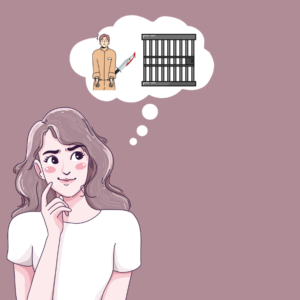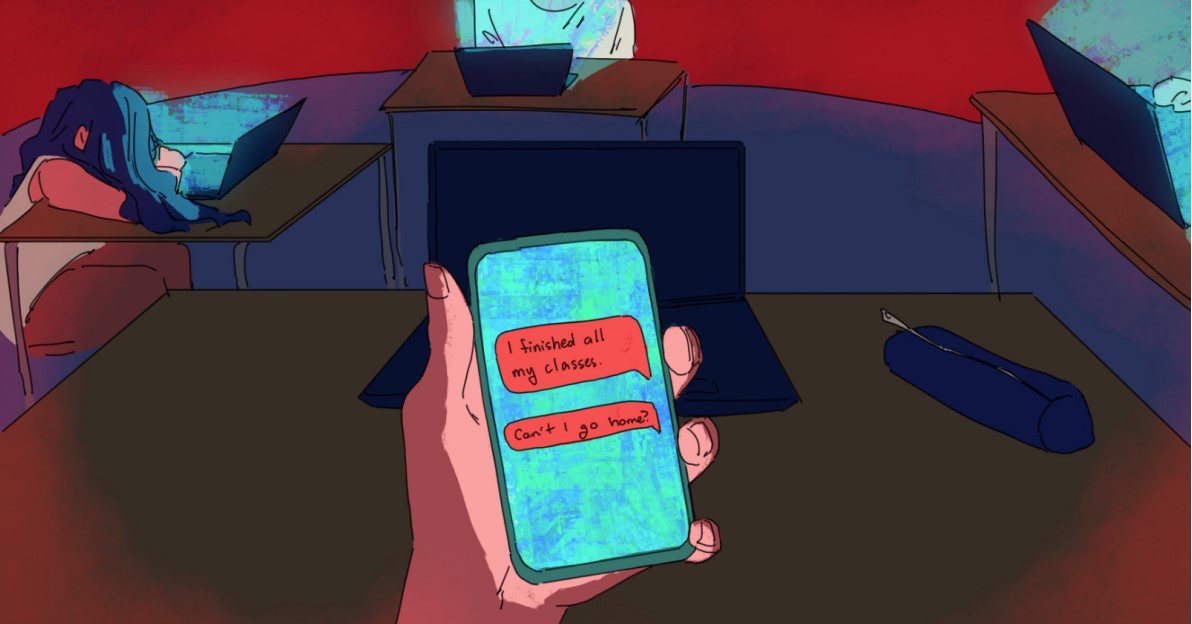The world around us is plagued with tales of gruesome crimes and senseless violence. With the rise of social media and streaming platforms, our perception of criminal behavior is continuously being shaped by the media we consume.
With each double-tap, swipe or save of an adverse post, there seems to be a silent shift towards the glorification of heinous crimes, an alarming trend that is slowly spreading among consumers.
Upon learning about how people romanticize killers, senior Kennedy Wyatt was appalled.
“People need to come to their senses about fantasizing about crime and the people who commit the crimes in the first place,” Wyatt said.
Between 1974 to 1978, notorious serial killer Ted Bundy was responsible for the deaths of numerous women and children. Despite his horrifying crimes, Bundy continues to be depicted as a charming figure in popular culture. Surprisingly, this portrayal has contributed to Bundy gaining a sort of “celebrity” status.
What Bundy apologists misunderstand is that the serial killer was not a charming figure—nor was he remotely attractive—rather, he was a cold-blooded murderer who was void of emotion.
Many individuals who romanticize these criminals fail to comprehend the immense pain endured by the families of Bundy’s victims. Instead, they are often inclined to romanticize the killer’s physical looks and deceiving “charisma.” This troubling trend is especially prevalent online, with countless videos dubbing infamous criminals as “attractive.”
Psychology teacher Lauren Prudhomme recognized the fact that the amount of crime admirers have been increasing, yet not much has been done to curb this behavior.

“Unfortunately, [the romanticization of crime] has probably been going on for a while, [as seen] with copycats and other people who have admired or followed [criminals],” Prudhomme said.
The fascination with brutal offenders has reached a fever pitch, most commonly seen in social media platforms and in the media itself.
While some exposure to the reality of crimes can increase awareness, the media often tends to sensationalize violent criminals. Responsible and ethical reporting should prioritize the victims and focus on the broader societal issues surrounding crime rather than solely spotlighting the perpetrators.
“The media is how we find out about things going on in the world,” Wyatt said. “It’s good for the media to be portrayed correctly, but I know there are some news outlets that use persuasive titles and mislead viewers.”
News outlets have a moral responsibility to not romanticize crime, as its effects can shift public opinion and lead to the diffusion of dangerous ideas.
With each national headline, our collective threshold for violence grows ever higher, until we become desensitized to news as heinous as murder, eventually dulling our moral compass and blurring the lines between right and wrong.
After quitting social media, Prudhomme felt a sense of relief to be detached from negative platforms.
“In some ways, I find social media to be one of the worst parts of humanity,” Prudhomme said. “Our brains fall into these primitive states of [conformity], almost like, ‘I just have to do what everyone else is doing.’”
The supposed appeal of serial killers could be attributed to their personality traits, such as their mystique and power. These criminals often possess a kind of bewitching charisma that can make people feel special for having an interest in something taboo. Their violent acts may also offer a sense of adrenaline rush, providing a thrill that some may find addictive.
Alternatively, from a psychological perspective, many grapple with feeling some sort of empathy for an individual who has a diagnosed personality disorder.
“The criteria for Antisocial Personality Disorder in the DSM-5 is that patients have a clinical lack of empathy or regard for other people,” Prudhomme said. “Am I supposed to feel empathy for that person who has a serious disorder, when looking at the terrible things they did?”
Additionally, the media can contribute to the growing thought of serial killers as masterminds.

“Sometimes, the media doesn’t portray exactly what happened throughout a certain crime case,” Wyatt said. “Of course they have to leave out certain details for safety, but they have to be unbiased.”
By continuing to turn infamous stories about serial killers like Ted Bundy and Jeffrey Dahmer into movies and documentaries, the media risks turning these criminals into celebrities.
What many individuals fail to comprehend is the severity of the emotional trauma that the families of the victims are subject to endure. Additionally, families lose the closure that they may need.
“The families feel like they don’t have the validation that they would want for their loss,” Prudhomme said.
This fascination with violent criminals can be attributed to many factors, including psychological and societal influences.
One defense mechanism coined by psychologist Sigmund Freud could explain why individuals start to act like their idols; it’s called identification, where individuals unconsciously adopt the characteristics of their admired figures.
“Personality-wise, some people are more attracted to–and not even in the romantic sense–to the darker side and aspect of life,” Prudhomme said. “Maybe they see something in themselves in the people they are looking up to.”
According to Dr. Scott Bonn, a criminologist and professor of sociology at Drew University, some people may see serial killers as “larger-than-life figures who possess a seemingly superhuman ability to take lives without consequence.”
While there is no specific psychological disorder that explains why some individuals may romanticize the actions of serial killers, some experts believe that it may be linked to traits commonly seen in disorders such as narcissism or psychopathy.
Serial killer stories should not be trivialized for the sake of our next binge-watching session or for exploiting quick profits by streaming giants like Netflix.
To live in a world that romanticizes killers because they’re “handsome” or “charming” is dangerous and should be put to an end.









